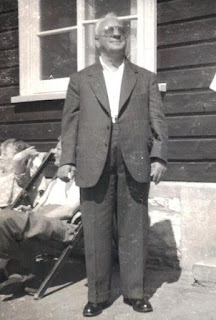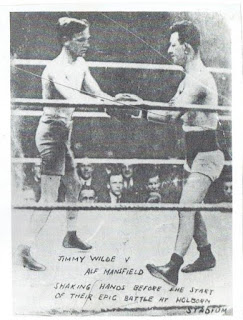Alf Mansfield battled the legendary Jimmy Wilde three times during his highly active ten-year career as a prizefighter. The British bantamweight's career effectively came to an end when he was disqualified during a fight and subsequently suspended, all while going blind.
***
Born Alfred Hyman, we don't know his exact date of birth. One record suggests a man by the same name was born in 1893 in London and passed in 1952, but Alf's grandson Michael believes his grandfather visited the family in New York after 1952. Suffice it to say, Alf was born somewhere between the late 1880s and early-mid 1890s.Alf Hyman kept his first name but fought under the surname Mansfield when he stepped into the ring for the first time as a pro on March 6, 1910 at the Judaen Athletic Club in London. Another Jewish flyweight from the Aldgate section of London had gotten his start at the club the year before. Ted 'Kid' Lewis would go on to become one of the greatest boxers of all-time. Mansfield's start was less auspicious. Debutant Jack Davis stopped him in the fourth round.
 |
| Alf Mansfield |
Alf won only one of his next nine bouts, all at the Judaen club. It seemed as if Mansfield should choose a new profession, but he quickly improved. After several good performances early in 1912, he graduated to Premierland, quickly becoming a revered venue for boxing. There Alf split a pair with the estimable Kid Kelly, who, despite the name, was also a Jew from London. Mansfield ultimately took three out of five bouts against the flyweight contender.
Throughout his career, there was a perpetual debate in the papers about whether Mansfield was "clever," with some using the adjective to describe him and others specifically claiming he wasn't. But no one ever questioned his toughness. In January of 1912, he fought eight times, including on back-to-back days... twice! In February, he took on another frequent opponent. Mansfield drew with fellow Londoner Dido Gains on February 10. The two would fight ten times; Mansfield had the upper hand after the first eight bouts with a 3-1-4 record, but Gains took the last two to even the score.
From November 11, 1912 when he took a ten-rounder over Gains, until the next March, Mansfield lost only one of nine fights. Over the next year and half, Alf continued to fight often. He won more than he lost, but suffered two stoppage losses at the hands of Percy Jones, an undefeated Welshman who would soon win the British, European, and world flyweight crowns.
On April 27, 1914, Mansfield took on another undefeated Welshman, Jimmy Wilde. Wilde, who held the world flyweight championship from 1916 until 1923, has been rated as the best flyweight in history by the IBRO and a top 20 pound-for-pound all-time great by both Ring Magazine and the IBRO. The bout between Mansfield and Wilde was scheduled for twenty (two-minute) rounds.
Wilde won the decision, but some in the crowd, primarily Mansfield supporters, believed that Alf deserved the nod. It was an indication of just how far Mansfield had come in boxing.
The next time Alf fought Wilde, war had broken out across the world. It isn't clear if Mansfield joined the Royal Armed Forces, but he was certainly active in the ring during the war. Soldiers in Britain had to be 19 years old, so it's possible that Mansfield wasn't old enough to join in 1914. He suffered plenty of injuries in the ring which may have disqualified him from service as well.
On October 2, 1914, Alf took on Wilde again, but he couldn't repeat his inspired performance of six months earlier. The fight was called for Wilde after ten of a scheduled fifteen rounds. That started a streak of four losses for Mansfield, including two to Dido Gains, the last times they would meet in the ring.
In 1915, Mansfield traveled to the United States. In St. Nicholas Arena in New York, he hit Abe Friedman on the break and was disqualified in the tenth and final round. He soon traveled to Pennsylvania where he fought in several no-decision bouts. On March 16, 1916, he boxed well in a six-round no-decision bout against Johnny Ertle, who held a claim of the world bantamweight title. Most newspapers felt the Brit deserved the win. After several more fights, Alf dropped a non-title affair in July to another claimant of the world bantamweight championship, Kid Williams, in Baltimore.
Fighting constantly, Mansfield came back to the United Kingdom in October of 1916. A year later, he split a pair of long decisions with a man named Walter Young Ross. Alf's third and final fight against Jimmy Wilde came on May 16, 1919 in a non-title bout. Mansfield held a 13-pound advantage.
His grandson Michael said that Alf had vivid memories of the fight. Mansfield later believed it was akin to the first fight between Joe Louis and Billy Conn where Alf was up on points before getting stopped just as Conn had. One contemporary source praised Mansfield's super-human ability to take punishment against Wilde. Other sources were even kinder. One said, "General opinion stated that it was the hardest fight Jimmy Wilde ever took part in." Another reporter claimed, "Mansfield is not so young as he used to be, a rather battered fellow is he; but I doubt there is anybody, except Wilde, who could beat him at his weight."
Another gushed, "As for Alf Mansfield, the last has not been heard of the plucky Aldgate lad, and it is quite expected that he may shortly secure the flyweight championship." It was not to be.
Two weeks after Mansfield's corner stopped the Wilde fight in the thirteenth round, he lost a stinker to Arthur Young Bishop in an eliminator for the British flyweight title. One reporter asserted Mansfield looked like "an impossible novice." The reporter continued, "Mansfield and Bishop had done their best to kill our love of boxing." Oof!
On July 21, 1919, Mansfield was disqualified in the thirteenth of a scheduled twenty (two-minute) rounds against a good prospect named Jack Kid Doyle. Mansfield was stopped a week later against an inexperienced opponent.
That fall, a hearing on the DQ against Doyle took place. A newspaper reported:
"Mansfield was declared by the referee to have been guilty of an inexcusable foul, and everybody who saw the contest spoke severely about it. The Board of Control decided that they would go into the matter, and last Tuesday, they held their inquest. Mansfield stated his case, the evidence of various responsible people was taken and carefully considered, and the verdict was suspension of Mansfield for three years. This is a severe sentence but the severity seems to have been merited and justified."
The suspension appears to have been reduced to one year on appeal. Mansfield fought for the final time, and the first time in sixteen months- by far the longest layoff of his career- on November 8, 1920. He was pulled out of the fight against Walter Young Ross after just ten minutes.
According to BoxRec, Mansfield finished his ten-year career with a record of 63-60-25 (including newspaper decisions).
In 1926, Alf married Hannah Salkind. The couple brought two daughters into the world. Prizefighting had not been kind to him, though. Mansfield possessed cauliflower ear. He became blind in both eyes because of boxing. In 1932, he traveled to Paris, France in the hopes that Professor Tariean could repair his sight. The procedure worked for a bit, but Alf's eyesight soon degenerated. During that period, Alf and Hannah ran a business together selling ointments and salves to those with arthritis.
His grandson Michael remembers Alf traversing the Atlantic and visiting him in New York in the 1950s. Michael recalls his grandfather looking much older than a man of about 60. Alf spent his remaining years in a nursing home. We don't know exactly when he passed at this time.
 |
| Alf Mansfield in old age |
Sources:
Counter, Cross. "Boxing: News and Gossip." The Wing. Mar 31, 1916.
"Sight Restored" South China Morning Post. Mar 30, 1932.
Silver, Mike. Stars in the Ring. 2016. Pg. 72.
"The Sport at Home Wilde's Foor Show." The Palestine News. Jun 12, 1919.
"The World of Sport: London 22nd May." South China Morning Post. Jul 1, 1919.
"The World of Sport: London June 5." South China Morning Post. Jul 15, 1919.
"The World of Sport: London Sept 18." South China Morning Post. Nov 6, 1919.
A special thanks to Alf Mansfield's grandson Michael Sheppard who provided all pictures and great information.



No comments:
Post a Comment